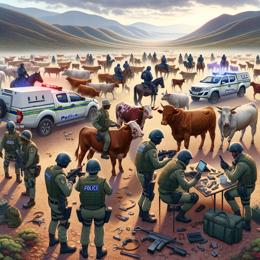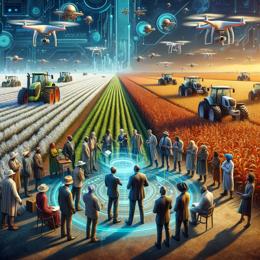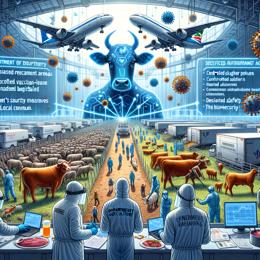Image created by AI
Sustainable Agriculture Unites Cultural Communities: The Thabake Business Enterprise Success Story.
In the fertile lands of North West, South Africa, a beacon of agricultural innovation and community spirit shines through the collaboration between AfriForum and Thabake Business Enterprise. Kicked off in early 2022, this joint agricultural development project recently marked the commencement of its third baby marrow harvest, signaling sustained success and continuing impact on local food supply and community welfare.
Under the leadership of CEO Lebo Mosime, the functional stretch of Boekenhoutfontein farm near Phokeng has transformed into a prolific agricultural site. The project, supported by other key players in the agricultural value chain, has not only achieved notable production milestones—such as harvesting more than 1200 kg of vegetables including red cabbage and green beans—but also fostered a strong bond with the community by channeling parts of its produce to support local institutions and initiatives.
The endeavor is notably marked by its holistic approach. Beyond producing high-quality vegetables for retail giants like NutriPick and Spar Kroondal, the project deeply invests in the local community. About 300 kg of green beans were donated to Tshimologo Hospice and Moremogolo Primary School, enriching the diets of many. Additionally, Mosime's gesture of donating green bean seeds to the primary school represents a forward-thinking ethos, promoting agricultural education and sustainability among younger generations.
Strategic support from AfriForum in the realms of management, planning, and agricultural expertise, including advice on crop varieties, fertilization, pest and weed control, and especially regenerative agriculture techniques, has been crucial. These efforts aim at evolving Thabake Business Enterprise into a model of profitable, sustainable agriculture.
Barend Uys and Nantes Kelder of AfriForum underscored the broader cultural and societal benefits of the project. It stands as a testament to how agricultural partnerships can bridge cultural divides, enhance food security, promote self-sufficiency, and foster stable, cooperative relations across diverse communities at the southern tip of Africa.
With continued support and expansion, the project promises not only to enhance the livelihoods of those directly involved but also to serve as a blueprint for similar initiatives, solidifying the role of agriculture in building sustainable, peaceful, and cohesive societies.










